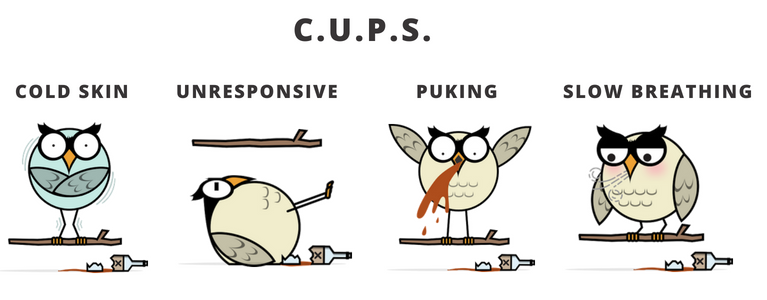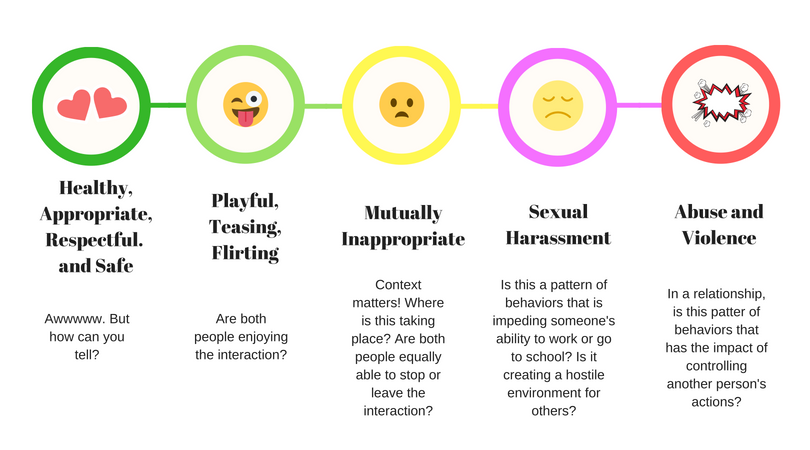Examples

Warning Signs and How to Help

- Remember the C.U.P.S. acronym!
- Shallow, slow, or irregular breathing
- Passed out
- Won’t wake up, or unresponsive
How to Help
- Try to keep the person awake
- Call 911 or 336.758.5911
- Stay with the person until help arrives
- Roll them into the “Bacchus” position

To learn more about how to help a friend showing these signs or symptoms, visit the website.
- Drinking-or being sick from drinking-often interferes with family, academic performance, and job
- Frequent binge drinking (for women 4 or more drinks in one day or seven or more drinks in one week, and for men 5 or more drinks in one day or 14 or more drinks in one week)
- Using alcohol to cope with stress or grief
- Drinking and driving
- Frequent blackouts
- Find that when the effects of alcohol wear off, experience withdrawal symptoms
- Making decisions based on alcohol
- Frequent hangovers
- Drinking alone
- Craving
How to Help
- Try to have a conversation. Express when they are sober how their drinking makes you feel. You may be met with excuses, denial, or anger but what does matter is that you express your love and concern with specific examples of behavior that has worried you.
- Keep in mind that change cannot be forced. It takes time for someone to seek help and develop new coping skills to overcome drinking. Being patient is important.
- Utilize the website to access local and national educational resources around Alcohol and Other Drugs (AOD)
To learn more about how to help a friend showing these signs or symptoms, visit the website.
Signs that a friend might have had an unwanted sexual experience or been sexually assaulted:
- Doesn’t remember whether or not they had sex with someone after drinking alcohol or using drugs
- Feels uncomfortable or avoids situations where they will see someone that they had sex with
- Is worried about risk for contracting STIs or pregnancy
- Can’t stop having negative thoughts or nightmares about a recent sexual experience
- Expresses feelings of fear, anger, or hopelessness after a recent sexual experience
How to Help
Remember-Stop, Drop & Roll!
Stop to assess for safety: Is the person physically and emotionally safe?
- Are they injured? Do they need medical attention? Are they worried about further violence or retaliation from the perpetrator or their friends?
- Are they thinking of hurting themselves or ending their life? Are they engaging in coping behaviors that put them at risk for further harm? Are they thinking of hurting someone else?
Drop Questions and Assumptions:
- Listen without judgment and with patience by limiting questions and leaving investigation and determining facts to those with that responsibility. Asking questions about what the person was wearing or whether or not they had been drinking can come across as victim-blaming. Let the person know that it was not their fault.
- Support the individual with compassion and empathy rather than by showing anger for the perpetrator(s). Sharing your own emotions makes it about you, rather than them, and they may feel that they now need to support you rather than vice versa. Get support for yourself to be able to process your feelings afterwards.
- Validate their feelings and reactions and acknowledge their strength. Say things like, “thank you for sharing with me,” “I’m so glad you told me,” and “it makes sense that you feel that way.” Try to mirror the survivors own language and avoid labeling their experience.
- Empower the individual to decide how much they want to share with you and what they want to talk about. Ask if they would like to know about resources that may be able to provide additional support.
Roll to Resources:
- Safe Office Help Line: 336.758.5285 or visit https://safeoffice.wfu.edu/ to find out how to help a friend who has been sexually assaulted.
- Call the police if you are worried about someone’s safety. Campus police can be reached at 5-911 on campus or 911 if you are off campus.
- Family Services 336-722-4457 https://familyservicesforsyth.org/find-help/safe-relationships/sexual-assault/
- RAINN 1-800-656-4673 https://rainn.org
- 1in6 (male survivors) https://1in6.org
Although most sexual assaults on college campuses are committed by someone the victim knows, it’s still hard to believe that our friends and loved ones could cause harm to another person. Sexual behaviors exist on a continuum from healthy, respectful and safe to abusive and violent. Review the continuum below and consider how you can tell where something falls. Sometimes we need to look twice to know whether or not both people are comfortable or giving their consent to participate in a sexual activity (adapted from Cordelia Anderson’s Continuum of Sexual Behaviors, 2011).

Read the list of warning signs below and consider whether or not you’ve noticed any of these behaviors before. Preventing sexual assault can be as simple as telling someone that you are concerned about how their behavior might be impacting others or not laughing at a demeaning joke.
- Talks about wanting to get someone drunk to hook up with them
- Prefers to only have sex after drinking alcohol or using drugs
- Shows aggressive behaviors after drinking alcohol
- Shows aggressive behaviors towards members of the opposite sex
- Uses derogatory language to refer to women, LBGTQ students, or other marginalized groups
- Sends sexually explicit messages to others without their consent
- Has a hard time hearing “no” from others
How to Help:
- Speak up when you hear someone make a comment or joke that demeans or puts down others based on their sex, gender, or sexual orientation.
- If it looks like someone might be trying to take advantage of someone who is drunk or passed out, ask them what they are doing or get one of their friends to step in.
- Challenge victim blaming comments- it’s never the survivor’s fault.
- Attend an event on campus to learn more about sexual and relationship violence or join our student group, ALIVE, which is working to end sexual and relationship violence.
- Call the Safe Office Help Line at: 336.758.5285 or visit https://safeoffice.wfu.edu/ to find out how to help a friend who has been sexually assaulted.
- Call the police if you are worried about someone’s safety. Campus police can be reached at 5-911 on campus or 911 if you are off campus.
Being able to tell the difference between healthy, unhealthy and abusive relationships can be more difficult than you would think. No two relationships are the same, so what’s unhealthy in one relationship may be abusive in another. Although there are many signs to pay attention to in a relationship, look for these common warning signs of dating abuse:
- Checking cell phones, emails or social networks without permission
- Extreme jealousy or insecurity
- Constant belittling or put-downs
- Explosive temper
- Isolation from family and friends
- Making false accusations
- Constant mood swings towards you
- Physically inflicting pain or hurt in any way
- Possessiveness
- Telling someone what they can and cannot do
- Repeatedly pressuring someone to have sex
How to Help:
Remember-Stop, Drop & Roll!
Stop to assess for safety: Is the person physically and emotionally safe?
- Are they injured? Do they need medical attention? Are they worried about further violence or retaliation from the perpetrator or their friends?
- Are they thinking of hurting themselves or ending their life? Are they engaging in coping behaviors that put them at risk for further harm? Are they thinking of hurting someone else?
Drop Questions and Assumptions:
- Listen without judgment and with patience by limiting questions and leaving investigation and determining facts to those with that responsibility. Asking questions about what the person was wearing or whether or not they had been drinking can come across as victim-blaming. Let the person know that it was not their fault.
- Support the individual with compassion and empathy rather than by showing anger for the perpetrator(s). Sharing your own emotions makes it about you, rather than them, and they may feel that they now need to support you rather than vice versa. Get support for yourself to be able to process your feelings afterwards.
- Validate their feelings and reactions and acknowledge their strength. Say things like, “thank you for sharing with me,” “I’m so glad you told me,” and “it makes sense that you feel that way.” Try to mirror the survivors own language and avoid labeling their experience.
- Empower the individual to decide how much they want to share with you and what they want to talk about. Ask if they would like to know about resources that may be able to provide additional support.
Roll to Resources:
- For more information, Call the Safe Office Help Line at 336.758.5285 or visit the Safe Office website
- Family Services 336-723-8125 https://familyservicesforsyth.org/find-help/safe-relationships/domestic-violence/
- LoveisRespect 1-866-331-9474 http://www.loveisrespect.org/
- National Domestic Violence Hotline 1-800-799-7233 https://www.thehotline.org/
- Contacting you constantly
- Obtaining details before you provided them
- Monitoring you excessively
- Showing up unannounced
How to Help:
Remember-Stop, Drop & Roll!
Stop to assess for safety: Is the person physically and emotionally safe?
- Are they injured? Do they need medical attention? Are they worried about further violence or retaliation from the perpetrator or their friends?
- Are they thinking of hurting themselves or ending their life? Are they engaging in coping behaviors that put them at risk for further harm? Are they thinking of hurting someone else?
Drop Questions and Assumptions:
- Listen without judgment and with patience by limiting questions and leaving investigation and determining facts to those with that responsibility. Asking questions about what the person was wearing or whether or not they had been drinking can come across as victim-blaming. Let the person know that it was not their fault.
- Support the individual with compassion and empathy rather than by showing anger for the perpetrator(s). Sharing your own emotions makes it about you, rather than them, and they may feel that they now need to support you rather than vice versa. Get support for yourself to be able to process your feelings afterwards.
- Validate their feelings and reactions and acknowledge their strength. Say things like, “thank you for sharing with me,” “I’m so glad you told me,” and “it makes sense that you feel that way.” Try to mirror the survivors own language and avoid labeling their experience.
- Empower the individual to decide how much they want to share with you and what they want to talk about. Ask if they would like to know about resources that may be able to provide additional support.
Roll to Resources:
- For more information, Call the Safe Office Help Line at 336.758.5285 or visit the Safe Office website
- Forced consumption of alcohol or other drugs or liquids
- Justifying activities by saying “it’s tradition”
- Secrecy of events
- Physical labor
- Physical abuse
- Purchasing items for members
How to Help
- Call the Hazing Hotline: 336.758.HAZE (4293)
- Anonymously complete a Hazing Reporting Form on the Hazing Prevention website
- For emergencies on matters that need immediate attention, call WFU Police at 336.758.5911 or dial 911
For more information, visit the Hazing website.
A bias incident is an act or behavior motivated by the offender’s bias against facets of another’s identity. Bias occurs whether the act is intentional or unintentional.
Bias may be directed toward an individual or group. Bias may contribute to creating an unsafe / unwelcoming environment.
Bias can impact students, faculty, or staff within the campus community.
How to Help:
- Complete a BIAS reporting form on the website.
- Reach out to other confidential resources on campus if the need is more immediate, including Deacon Health, University Counseling Center, Chaplain’s Office, University Police (extension 5911), and the Safe Office.
